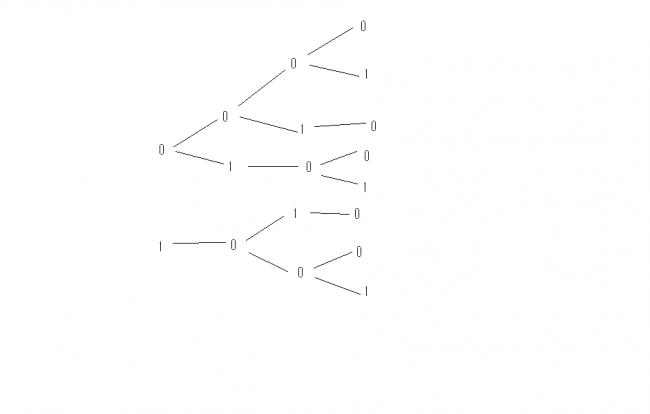in other words, how can you prove that the recursion formula of fibonacci is applicable in this situation too?
Define a "valid n-bit binary word" as a n digit long sequence of 0's or 1's in which no two or more consecutive 1's are present. For example, for n = 3, we see that of all the 3-bit binary words possible: 000, 001, 010, 011, 100, 101, 110, 111; exactly three ---- 011, 110 and 111 ---- are not valid but the rest of them are valid.
Question: Find out the number valid binary words formed with n bits.
P.S: Edited.
-
UP 0 DOWN 0 0 6

6 Answers
Anant sir.... in the example given 011 is also invalid
number of valid binary words is coming to be (n+2)th term of fibonacci series
for n=1 : 0 and 1 are two possible binary words
for n=2 onwards
suppose 1st digit is 0 then the nextr digit can be 0 or 1 (2 cases)
suppose 1st digit is 1 then next digit must be 0 (since two consecutive 1's can't occur)
so as n increases every 0 will produce 2 cases and every 1 will produce 1 case

for n=1 : 2 cases
for n=2 : 3 cases
for n=3 : 5 cases
for n=4 : 8 cases
it is becoming a fibonacci series
\frac{(1+\sqrt{5} )^{n+2}-(1-\sqrt{5} )^{n+2}}{2^{n+2}\sqrt{5}}
You won't call that a proof by looking at a few cases for n, will you? It must be proved for an arbitrary n.
Actually it was kind of a hint or you may say half of the solution and i left for others to try and arrive till final step
by proceeding as shown in diagram above suppose for r digit 'xr' number of zeros are available and 'yr' no. of 1's are available (for r digits : no. of possible words , wr=xr+yr)
since each 0 provides with two cases next digit can be (0 and 1) and each 1 provides with 1 case (next digit is 0)
so, xr+1=xr+yr=wr and yr+1=xr
for r+1 : total no. words, wr+1 = xr+1 + yr+1
since xr+1 = wr and yr+1 = xr=wr-1
so, wr+1 = wr+wr-1
also we know w1=2, w2=3.....
the formula which I have shown can be derived by generating polynomials which i learned from Hari sir :)
http://www.goiit.com/posts/list/differential-calculus-hard-question-951552.htm